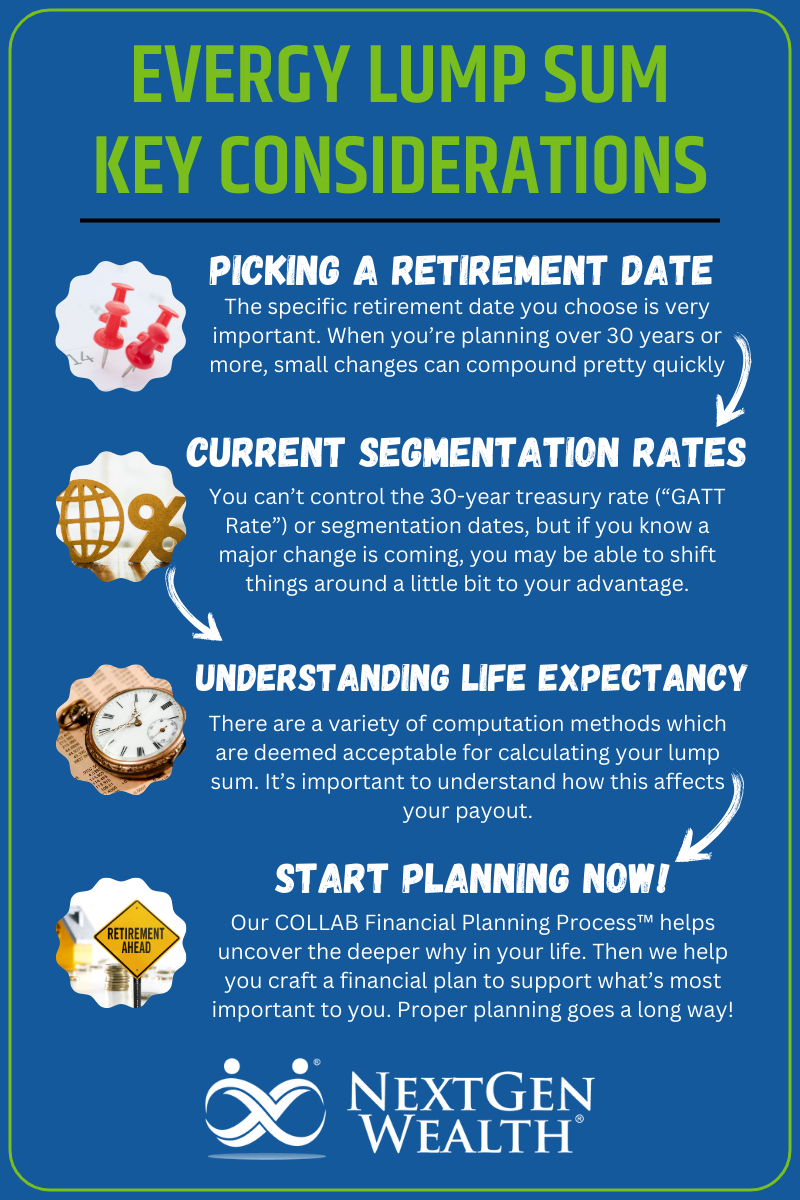Understanding Evergy Pension Lump Sum Options

Choosing between a lump sum or annuity payout is one of the largest decisions an Evergy retiree will make. Evergy has many pension payout options, but which one is best for you? A lump sum payout is an option for all the different pension programs under the Evergy umbrella.
It’s important to know exactly what options you have and what you can or can’t control regarding a lump sum payout. Doing your research and really thinking through your options is absolutely necessary.
Table of Contents
Understanding a Lump Sum vs Annuity-Style Pension Payout
The biggest consideration on annuity versus lump sum is how and when you want to utilize the money. Other considerations include current lump sum calculation variables and potential market returns (educated guesses).
Annuity Payout Considerations
An annuity payout can come in many different ways. However, the concept is the same – you’ll receive regular monthly payments for a certain period of time. Normally, an annuity-style pension payout lasts for your lifetime, but you may have survivorship options to choose from as well.
Brief Summary of Pension Payout Options
Our article on pension payout options covers more details, but we’ll cover the basics here. For Evergy employees specifically, you will have options including:
- Straight Life/Single Life: Set dollar amount for life.
- Period Certain: Guaranteed payout for a specified number of years regardless of whether the beneficiary passes away.
- Joint and Survivor: Lasts for your lifetime and your designated secondary beneficiary (usually a spouse).
- Level Income: Higher payout to start and decreases when Social Security kicks in.
To learn more about these options in a simple, easy-to-read guide, download our Pension Guide for Evergy Retirees here.
Overview of Lump Sum Benefits
In short, a lump sum payout is exactly what it sounds like – a big chunk of money all at once. Typically, this would be transferred into a retirement account, so you’re not taking a big tax hit all at once.
Evergy-Specific Lump Sum Calculations
Calculating pensions can be very complicated, and knowing how Evergy computes your benefits is critical. Although all pensions must follow the same general guidelines, they can tailor specific variables to meet their needs. The IRS has established additional rules and details for pension plans, which affect how Evergy completes its pension lump sum calculations.
Segmentation Rates and Critical Dates
Your pension calculations are based on different “discount” rates for three segments of your retirement: the first five years, years 6 through 20, and years 21 and beyond. It is important to understand when rates will affect you the most.
The rates for later segments are higher, so your lump sum calculation might be even lower if you retire early. The higher the rate, the lower your pension payout. Therefore, you want to be extra cautious with rate changes.
Evergy Pension Segmentation Rates
The IRS publishes minimum present value segment rates for each month. However, Evergy uses the May segmentation rates for each pension year. The pension year begins on October 1st of each year and runs through 30 September.
In other words, rates are locked in one year at a time, allowing you to start comparing options several months in advance. However, the pension benefit calculator on the Evergy Mercer Pension Center portal usually takes a few months to update (usually in July).
Knowing these details can help you decide what’s best for you. It is important to understand what’s within your control and what isn’t.
Variables Outside of Your Control
It does us little good to try to predict the future or get analysis paralysis. You’ll have to make the best decisions today based on known facts and our best assumptions (fancy guesses). However, you still want to know how these variables affect other decisions you can control.
Current Rates for GATT and Segmentation
You can’t control rate changes like the 30-year treasury rate (sometimes called the “GATT Rate”) or the published segmentation dates we discussed earlier. Just because you can’t control them doesn’t mean you shouldn’t be aware of them. If you know a major change is coming, you may be able to shift things around a little bit to your advantage.
Life Expectancy Tables
Another key variable is your life expectancy. Once again, you can’t control this, and it’s not your specific life expectancy. There are a variety of acceptable computation methods for life expectancy. If you’re curious, you can read more about the history and most recent laws in Internal Revenue Bulletin: 2023-46.
However, you can’t change anything about the life expectancy used to calculate your pension. It’s just one of the variables you need to know.
Variables You Can Control
There are some variables you can control when it comes to your pension. The main one is your retirement or “commencement” date.
Picking a Retirement Date
The specific retirement date you choose is very important. Although it might not seem like a huge difference, small calculation changes can compound quickly when we expand to 30 years or more of benefits.
For Evergy specifically, the new pension year starts on the 1st of October each year. You can only pick the 1st of any month as your commencement date.
For instance, if you plan to stop working on the 5th of August, your earliest commencement date would be the 1st of September. This is important because if you know the segmentation rates are higher starting the 1st of October, you’d want to stop working on or before August 31st to have a commencement date of September 1st.
If you knew rates were lower, you could wait for a later commencement date and get a higher payout. Starting in July of each year, you should be able to compare your final average earnings (FAE) and resulting lump sum calculations for both plan years. However, if rates are the same for both years, it might not matter at all.
Other Considerations for Choosing a Lump Sum
One of the biggest “non-money” considerations is how you’ll actually use the money. The purpose of retirement is to enjoy it, not worry about losing money or trying to save more. You might not want to take the lump sum if you won’t use the money for regular income.
However, you may have some specific concerns about the long-term viability of your pension plan. You can check out our discussion on pension insurance to get more information on pension protections.
The bottom line is this: how you’ll use your pension or lump sum matters as much or more than anything else. You are the most important variable!
How NextGen Wealth Can Help
Our clients, who are current or former Evergy employees, are some of the best people to work with. We regularly review updates to lump sum calculations and run different scenarios to determine the optimum pension payout options. However, knowing your needs, habits, and retirement goals is essential.
We guide our clients through our COLLAB Financial Planning Process™ to help uncover the deeper why in your life. Then, we help you craft a financial plan to support what’s most important to you. Deciding to take a lump sum or not also needs to support your deepest hopes and aspirations.
Contact us today to see if we’re a good fit and get your financial assessment!




